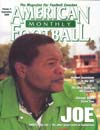AMERICAN FOOTBALL MONTHLY THE #1 RESOURCE FOR FOOTBALL COACHES
Article CategoriesAFM Magazine
|
\'Do Right...\'by: Gene Frenette© More from this issue As William "Billy" Joe sat in his hotel room in Tallahassee on that January afternoon in 1994, awaiting his job interview with Florida A&M University officials, hardly anybody in Florida's capital city knew who he was or why he was there. Nearly all of the city's residents were caught up in a parade through the downtown streets for Florida State as the city celebrated the Seminoles' first national title. Little did the football-crazed fans realize that Joe was formulating his own championship game plan, not just how to convince Florida A&M University to hire him, but how he intended to take Rattler football back to the coaching glory days of FAMU legend Jake Gaither. "I don't think anyone in Tallahassee knew I was even in town that day," Joe said. They know exactly who Joe is now and wha....The full article can only be seen by subscribers. Subscribe today!
|
|
|||||||
| HOME |
MAGAZINE |
SUBSCRIBE | ONLINE COLUMNISTS | COACHING VIDEOS |
Copyright 2025, AmericanFootballMonthly.com
All Rights Reserved





